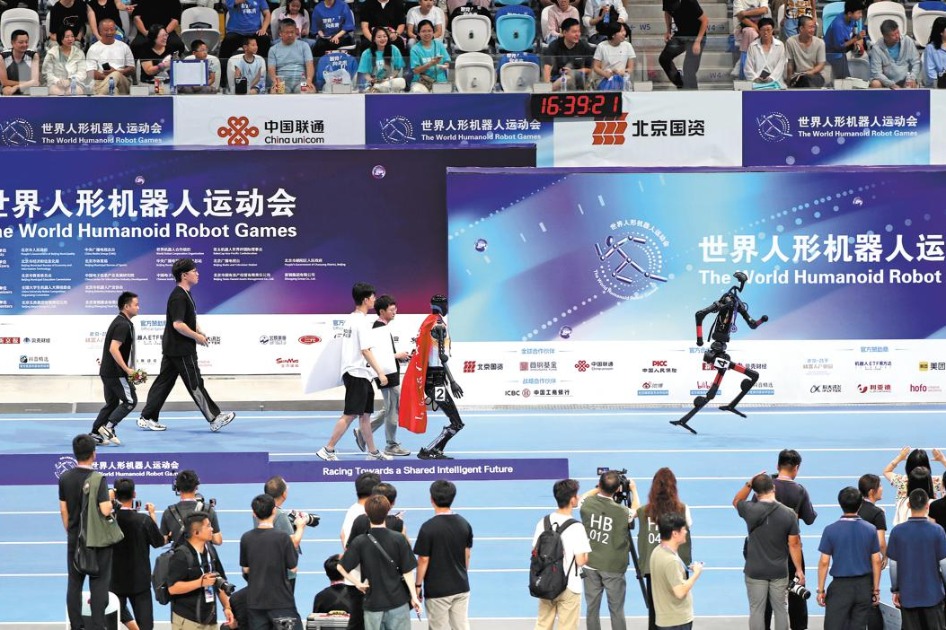Chinese experts advocate human-centered AI in education at global conference

BEIJING -- Chinese education experts have emphasized that AI should serve as a powerful enabler rather than a replacement. They have advocated for a human-centered approach that integrates technology to enhance educational quality, foster creativity, and support students' holistic development in the intelligent era.
These remarks were made during the recent Global Smart Education Conference 2025 in Beijing last week, co-organized by Beijing Normal University and the UNESCO Institute for Information Technologies in Education.
Under the theme "Human-Machine Collaboration Fosters a New Ecology of Education," the event gathered specialists from the education, technology and enterprise sectors, along with frontline teachers -- to explore pathways for deeper integration of emerging technologies in education.
At the forum on high-quality school development in the new era, principals and scholars from across China shared insights on digital transformation and intelligent upgrading in school education.
Li Youyi, chairman of the School Alliance of Educational Digitalization, highlighted that the deep integration of new technology and education has become a core issue in global digital transformation.
She urged school leaders to proactively embrace technological opportunities while remaining mindful of its dual-edged nature, ensuring that technology always aligns with the fundamental values of education.
Sharing practical experiences, Xu Hui, principal of the No 1 Middle School affiliated to Central China Normal University in Central China's Hubei province, outlined her school's experiments with AI-enhanced curricula, human-computer collaborative teaching and data-driven personalized learning.
She emphasized that innovative talent should no longer be viewed merely as repositories of knowledge, but as deep comprehenders and creators of future knowledge. "AI is not a substitute for education -- it is an amplifier. Human intelligence must remain central, working synergistically with machine intelligence," she noted.
Echoing the need for educator development, Wu Yingming, principal of Hefei No 1 High School in East China's Anhui province, proposed that teachers strengthen four core capabilities in the AI context -- aesthetic appreciation, cultural understanding, scientific reasoning and value judgment.
These competencies will enable educators to better discern authentic information, integrate technology with teaching fundamentals, and foster students' core competencies through teacher-student-machine interaction.
Zhang Hua, vice-dean of Changsha Normal University's primary education college in Hunan province, Central China, emphasized three guiding principles in facing AI -- use, use wisely and do not abuse. The college combines national and project-based curricula, stimulates student interest through activities, and provides teacher training and incentives to improve digital competence.
Warning against treating AI as a panacea, Wang Xiao, principal of No 3 Primary School in Yumin county, Northwest China's Xinjiang Uygur autonomous region, stressed the importance of guiding students to become creators of technology rather than passive users. Wang reiterated that AI should empower -- and not replace teachers.
Adding a corporate perspective, Nie Xiaolin, co-founder of China's leading AI company iFLYTEK, introduced the concept of "two-way empowerment" between AI and education. "While AI empowers education, education also feeds back into AI, improving its capabilities in the educational domain," he explained.
To address a shortage of qualified science teachers in primary schools, iFLYTEK has partnered with the China National Institute of Education Sciences to develop a three-dimensional knowledge graph and a teaching logic-driven large model for science education.
By learning from over 50,000 courses taught by expert teachers, the system makes implicit teaching experiences visible -- helping educators instruct like experts and inspiring students to think like scientists.
- Chinese experts advocate human-centered AI in education at global conference
- Chinese political advisors urged to pool wisdom for drafting of 15th Five-Year Plan
- World's tallest bridge completes load test in SW China's Guizhou
- Racing on the roof of the world
- Boy wins praise for cleaning up spilled beverage on subway
- Husband, mother-in-law held after woman dies of suspected domestic abuse




































